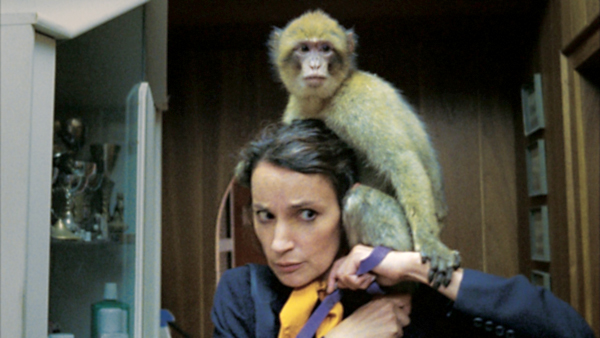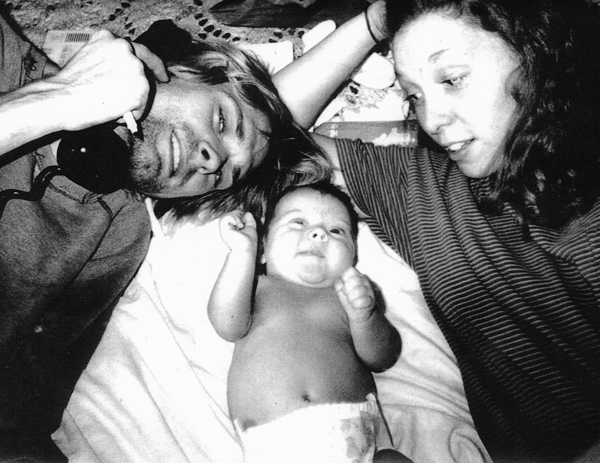|

Reviews of Recent Independent, Foreign, & Documentary Films
in Theaters and DVD/Home Video

New Directors/New Films 2011
Presented by the Museum of
Modern Art and the Film Society of Lincoln Center
March 23 – April 3, 2011
Overall, the slate for the 40th edition of
New Directors/New Films is wildly spotty. The program should take a
lesson from the Tribeca Film Festival: less is more. A handful of films
could easily be shed for a tighter focus so that the series really
becomes a showcase and not just a literal realization of its name. As
usual, the selections with the best buzz have already garnered top
awards around the world: Incendies was nominated for an Oscar
last month, Happy, Happy won a grand jury prize at Sundance, as
did Octubre at Cannes. However, there are a few diamonds in the
rough. Since some of the finest films from
last year’s edition—Tehourn, Northless, The
Evening Dress—have yet to be screened at your nearby Landmark
Theatre, here’s a road map from three perspectives as the films below
make their way around the country.
For a film with an original voice, it’s tough to beat Pia Marais’s droll
At Ellen’s Age. Sounds like a coming of ager for an
adolescent or a teenager, right? It is, kind of—but for a dazed
40-something flight attendant, Ellen (the bird-like Jeanne Balibar), who
has left her part-time boyfriend, may have a life threatening illness,
and has just been fired. The film’s a bumper-car of a ride, the flip
side to an Eat Pray Love-type of manifesto. The film takes
Ellen around the world, but nowhere near an idyllic resort; she squats
with kids half her age instead. She fumbles about, anchorless, not
knowing what she wants; and when she does, she still takes her cue from
others. At least she’s somewhat self-aware, admitting to a new boyfriend
that’s he’s just a bridge for her, and “nothing more.” Hand-held
realism alternates with an otherworldly, alternative world of airport
hotels—filled with the lonely and rock-star level of
debauchery—and, later, nude street theater. Ellen’s ex-boyfriend is
right, she’s sleepwalking through life, but with eyes wide, wide open.
In a scathing and crazily convoluted look at a pop culture footnote,
Australian director Matthew Bate goes back to the recent past, before
the reign of YouTube, in his twisting and absorbing self-described auto
vérité, Shut Up Little Man! An Audio Misadventure. In
1987, two college grads from Wisconsin, Eddie Lee Sausage and Mitchell
D., moved to San Francisco and lived in a dumpy apartment with
paper-thin walls next to two raging-all-through-the-night alcoholic
neighbors, one a redneck, the other a snippy queen. After the former
threatens to kill Eddie for complaining about the noise, the
Midwesterners take a passive form of revenge, sticking a microphone out
of their window and recording the nocturnal and monotonous rants. (The
title comes from one of the oft-repeated put downs. Most of the
retorts can’t be posted on a family website.) Eventually Eddie and
Mitch collected 10 hours of tapes over two years (all without a
copyright—at first) and passed them around. Their popularity reached the
point of the material inspiring a play and three competing film
projects. One producer envisioned Brando and Nicholson as the stars.
What started out as a goof is a jaw-dropping and tangled case of
copyright infringement beyond what any music sampler could imagine, and
that’s not forgetting invasion of privacy issues.
Egypt has pride of place this year with two films that are very much of
the moment. Part documentary and let’s-put-on-a-show hip-hop
celebration, Ahmad Abdalla’s angry and rowdy Microphone
heeds few narrative conventions. There’s a germ of a plot about
underground Alexandrian hip-hop and metal bands striving for artistic autonomy, but the film is mainly free form. The hip-hop
hipsters, looking for a grant from the government, face a lot of
resistance: no obscenities or English lyrics. An all-girl band appears on
camera with their faces obscured, in case of retaliation, and there’s always the threat of
the cops shutting down a concert, if the neighborhood mosque doesn’t
complain first. Time will tell if Microphone, padded with protest
songs, is a snapshot of pre-2011 Egypt or a momentary stand for the
freedom of expression. And where else are you going to see the
seven-year-old T, the youngest MC in Egypt?
For those who like their storylines streamlined, Mohamed Diab takes on
sexual harassment and internalized misogyny in the crowd pleasing and
polemical 678, inspired by real events. Storylines involving three women from different social/economic strata
weave in and out of each other—some coincidences click, some clunk. A
full-fledged two hander, 678 at times verges on turning into a
boo-hiss melodrama, but it’s the rare film that will elicit cheers
within the usually sedate Museum of Modern Art. Maybe now, thanks to
current events, the equally didactic but more diverting and
ambitious
Scheherazade, Tell Me a Story will finally receive the attention
it deserves. (A couple in Microphone even discusses this 2009
homegrown hit.)
Set in Ghana, American director Deron Albright’s The Destiny of
Lesser Animals bears the telltale signs of a first film—uneven
acting and simple camera blocking—but it has plenty of grit: stakeouts,
a woman of mystery, and the on-location hustle and bustle of the capital city,
Accra. A police inspector wants to return to the U.S., from where he was
deported years earlier. After saving up, he buys an expertly made
counterfeit passport—which is snatched from his hands immediately after
purchase. He then concocts a lie that his gun was stolen in order to
enlist the aid of a veteran cop to track down the culprit. Despite
obvious plot developments, the film takes a clear-headed and moving turn in tone
towards the end.
More an impressionistic photo-essay than documentary, El Velador
loosely follows the title’s night watchman, his dogs, and the
assembly-line construction of an ever-growing cemetery in northwestern
Mexico.
From one angle, a row of mausoleums (some sleek, some traditional, one
with an ornate chandelier) looks like a land-locked beach community,
except for the crosses everywhere. (El velador lives in the shack in the
background.)
News snippets from radio and TV of the escalating drug-related violence
provide the slenderest context about this boom town
for the departed. As the press notes state, it’s a film about violence
without violence. The film already has a date on PBS’s
POV series for 2012. How it holds up on the home screen (and any
nearby distractions) is another matter. On the wide screen, it’s easier
to surrender to the slow pace and the contemplative and
often peaceful ambiance. There the beautifully photographed film can be seen
to its best advantage.
Two young women, standing a foot apart, lean towards each other, tongues
squirming out, touching, and then slithering into the other’s mouth: a
hands-on tutorial between two friends. That’s the opening provocation in
Athina Rachel Tsangari’s
Attenberg, whose title derives from the name of natural history filmmaker Sir David Attenborough. Like Attenborough,
Marina (Ariane Labed) observes, taking an anthropological view of life,
especially when it comes to men. Humans are the animals on display here. But
like last year’s outsider entry, Dogtooth, also
from Greece,
Attenberg keeps the viewer at bay, deliberately trying to raise
eyebrows—Marina asks her father if he has ever imagined her naked; some
things should remain taboo, his reply. He’s dying of cancer and wants
his 23-year-old daughter to live outside her odd, insular bubble, and
Marina begins taking tentative steps, clinically approaching her first
sexual experience. (In exasperation, her partner/specimen pleads, “I beg
you, stop describing what you’re doing.”) Maybe after Dogtooth’s
transgressions, it’s a little harder to surprise us with eccentric
behavior. Kent Turner
Many of the films in the series look at young folks around the world
dealing with strictures on their lives. Of films not yet slated for
wider distribution, here are many that reveal young lives, from the most
constricted to those with too much freedom.
Curling
Twelve-year-old Julyvonne (Philomène Bilodeau) is kept in protective
isolation by her excessively fearful father, Jean-François (Emmanuel
Bilodeau). Surrounded by the limitless horizon of windswept snow in
rural Québec, her personal landscape is so undifferentiated that it’s a
surprise to both of them that she needs glasses. (They’re
sympathetically portrayed by a real-life father and daughter.)
Writer/director Denis Côté, in his fifth feature film, doles out some
hints and shocking glimpses of why the father goes to such extreme and
yet unsuccessful measures to keep her isolated. Through mostly silent
experiences, Julyvonne, more than a bit bizarrely, adapts to his
restrictions, such that joining with other families tobogganing becomes
a celebration of liberation for both of them.
Winter Vacation
There’s no shortage of comedies about holidays, spring breaks, and
summer vacations, but writer/director Hongqi Li’s third feature provides
a kids’ view of the frustrating limits during a week off from school in
China’s Inner Mongolia. The temporary break leaves nine bored teenagers,
two restless children, and their extended families and neighbors at
loose ends. They devolve into repetitive, and increasingly amusing,
routines. The deadpan humor is as dry as the snowflakes that cover their
bleak section of town dominated by drab, Soviet-era apartment blocks. No
wonder the little kids think that running away to be orphans would be
their best hope for the future than going as stir crazy like
the grown-ups.
Majority
In his first feature, writer/director Seren Yüce doesn’t seem very
optimistic about the young generation in Turkey raised with the material
benefits of corrupt crony capitalism. Since childhood, pudgy 21-year-old
college dropout Mertkan (Barta Kucukcaglayan) is bullied by his father,
who looks and talks a lot like a Turkish Tony Soprano gone just barely
legit in a booming construction business. Mertkan hangs out in Istanbul
with his dissolute friends, who sponge off him. His secret, though oddly
desultory, affair with Gül (Esme Madra), a Kurdish student/waitress from
a distant village, sparks a rebellious interlude before he’ll fall into
line in the army and the family firm. (In the English subtitles,
Mertkan’s friends and relatives pejoratively call her a “gypsy.”) In an
equally pessimistic view of women’s lot, Gül’s home life, which she’s
escaping from, must be pretty bad that being with the insensitive
Mertkan in the big city is an improvement.
Man Without a Cell Phone
Debut director/co-writer Sameh Zoabi returned to his home town of Iksal,
an Arab-Israeli village near Nazareth, to find unusually gentle humor in
the ironies and stresses of growing up modern in a traditional
Palestinian society surrounded by politics. A handsome 20-something
Muslim, Jawdat (Razi Shawahdeh), is stuck making concrete with his
cousin, unless he can pass the local university’s Hebrew exam. He would
keep juggling several beautiful women via cell phone—one with
disapproving Christian parents; another on the West Bank, inaccessible
through roadblocks and phone taps; and a college student, whose honor is
zealously guarded by her brother the policeman—if only Jawdat’s
suspicious father would stop messing with the cell phone tower on the
adjacent property. Entertainingly, Jawdat finds amusing ways to appeal
to everyone’s self-interest in organizing a protest against the Israeli
and local authorities to move the tower, and incidentally proves
that a flirt turned non-violent leader looks like a fighter, at least in
this breezy comedy.
Belle Epine
The good girl attracted to the guy racing motorcycles is a trope of
adolescent rebellion going back to The Wild One (1953). Debut
director/co-writer Rebecca Zlotowski delves unusually deep and
sensitively into what drives one French 17 year old to hop on back. The
family of Prudence Friedmann (Léa Seydoux) is reeling from the death of
the mother, making Prudence feel abandoned and alone, despite relatives
who take her into their observant Jewish home. She isn’t just led astray
by the bad girl at school. She chooses the dark thrills and excitement
of a late-night motorcycle hangout to mask her grief by experimenting
with sex and drugs until she can finally, and touchingly, face her
mother’s memory.
Hit So Hard
is a cautionary story of youth with too much freedom, with some new
angles to the usual Behind the Music arc of the rise, fall, and
difficult recovery of a rock star. Subtitled “The Life and Near-Death
Story of Drummer Patty Schemel,” director P. David Ebersole’s first
feature-length documentary is noteworthy for the intimate excerpts from 40-plus hours of hi-8 video footage Schemel took while recording and
touring with the Courtney Love-fronted band Hole in the 1990s, and (in
heartbreakingly happier times) living with Love, her late husband Kurt
Cobain, and their baby, Frances. In addition, Schemel’s brother—and
co-dependent addict—Larry saved tapes of all of her TV appearances
during the reign of Seattle rock. Highlighted by frank interviews with
her bandmates and music colleagues (particularly a starkly fresh
interview with the ever unapologetic Love), the film insightfully
emphasizes the difficulties of being gay first in a small blue-collar
town and then in a straight girl band, even while grunge adopted
lesbians’ flannel shirt style. Nora Lee Mandel
Hospitalité
Koji Fukada’s Hospitalité capitalizes on Japan’s insularity,
social rigors, and cramped living spaces to orchestrate a nuanced and
surprisingly insightful comedic gem. When a strange man weasels himself
into the quiet lives of a family living above their small printing
factory, he launches a campaign of charm and blackmail to turn their
lives topsy-turvy. Before long, marriage bonds are shaken and a conga
line of eclectic foreigners sends the xenophobic neighborhood into a
tailspin. The film swiftly moves from a simple narrative into an
absurdist, almost theatrical play, all in the confines of a small home
in downtown Tokyo. Hospitalité is as unusual as it is enjoyable.
Outbound
Another troubled voice from the Romanian New Wave follows a young woman
on 24-hour leave from a long prison sentence. Her intentions to flee the
country become clear after the first few scenes, but the rest of the
setup—who she is, what she’s done—are slowly revealed over the next 90
minutes. The camera often lurks behind as she walks with stoic
determination, visiting her estranged brother, her family home, her
degenerate ex-boyfriend, all in a mysterious effort to set the stage for
her escape. Bogdan George Apetri’s filmmaking is confident and
straightforward—no touching music or tempting flashbacks luring the
audience to commiserate. And though we may not grow to love her, her
tragedy is invariably felt.

|
Copacabana
In may be her most straight-laced role to date, Isabella Huppert plays Babou, a reckless, itinerant free spirit who has never grown up.
Outfitted in brightly colored miniskirts, saris, and furs, Huppert stars
opposite her real-life and on-screen daughter (Lolita Chammah) in Marc
Fitoussi’s charming family study. Her daughter revolts against a
lifetime of Babou’s unconventional ways by choosing to marry a safe
marketing executive (and not extending a wedding invitation to her
unpredictable and often embarrassing mother). In an attempt to change,
Babou then takes a job selling timeshares in Ostend, Belgium—possibly
the most depressing setting ever committed to screen. Despite the
predictable plot of this gentle comedy, the effect of watching it is a
pleasant one.
Memory Lane
Except for the occasional appearance of the Paris skyline, watch Mikhaël
Hers’s Memory Lane on mute and it’s almost indistinguishable from
a homegrown mumblecore indie. The sweet but sophomoric film is framed by
nostalgic narration in the style of a poem unabashedly read aloud in
high school French class. It’s the story of seven friends lingering
somewhere in their 20s, who reunite in their suburban hometown one
memorable August. Some come home under tragic circumstances, and others
have never left. In either case, the underlying emotions are dulled by
the fitting marriage of sexy French insouciance and indie cool—so much
so that it takes the length of the film to become emotionally involved
with even the fieriest of characters.
Some Days are Better Than Others
Carrie Brownstein should stick to
promoting Portland in her own ingenious sketch comedy show Portlandia
because this feature film take on the city (in which she stars) is a
bland, uninspired flop. Joined by James Mercer (lead singer/songwriter
of the Shins and Broken Bells, and a dead-ringer for a young Kevin
Spacey), this uber-talented indie duo can’t save director Matt
McCormick’s cookie-cutter exploration of awkward and aimless young
adulthood. As so often happens, there is a bevy of painfully sincere
characters desperately trying to communicate. Except for Mercer’s
somewhat charming karaoke of “Total Eclipse of the Heart,” the film
makes no overtures to the cast’s musical talents. (Brownstein is also
the former guitarist/vocalist for the Portland band Sleater-Kinney). And
except for some shout-outs to Stumptown, community gardens, and swaths
of unemployed quasi-youths, Some Days are Better Than Others
could have been set in any other city where, according to independent
cinema, boredom and shyness reign supreme.
Summer of Goliath
Summer of Goliath
is a desperately arty portrayal of a Mexican village composed of several
disjointed character portraits. An odd combination of documentary and
fiction, the film centers on a woman spiraling out of control after
being abandoned by her husband, two teenage soldiers itching to be
issued machine guns, and a spattering of peripheral town folk rounding
out the narrative mess. The film’s yearning for artistic credibility is
rewarded in some beautiful out-of-focus shots, but other excessively
long and tedious scenes reek of self-indulgence. Director Nicolás Pereda touches
on a torrent of issues—corruption, violence, poverty—and makes the audience
dizzy with all of these unexplored scenarios, but the result is
ultimately a failure.
Gromozeka
This
is the result of a strained and misguided attempt to add meaning and
symbolism to the melodramatic filmmaking for which Russian filmmakers are known.
This devastating (and not in a good way) story of three middle-aged men
carving out a sad existence in a gloomy wintry Moscow is so ludicrously
stuffed with sins and calamities it’s difficult to decide who we’re
supposed to feel sorry for. As if unable to pick just one tragic twist
from a screenwriting brainstorm, director Vladimir Kott eagerly delivers
illness, prostitution, violence, and more than one marital breakdown to
his supposedly tear-starved audience. What’s worse, potentially
beautiful scenes staged to deliver optimal poetic meaning (an
optometrist speaking to her estranged husband through her optical
refractor) are delivered so often and so shamelessly, the entire film
quickly begins to feel like a joke.
Tyrannosaur
On a different note, here’s
a film to look out for. Actor-turned-director Paddy Considine’s festival
standout Tyrannosaur is a frightening depiction of socialized
violence in an English backwater. Peter Mullan commands the screen as
Joseph, a mean, lonely, old drunk whose violent temper constantly
overflows into bloody altercations. His performance is as loud and
turbulent as it is achingly tender. When Joseph’s life become
intertwined with a local woman, whose lot may be more desperate than his
own, he tries to see himself through her pious and forgiving eyes to
decide whether or not he is, in fact, a monster. The violence on the
screen is degenerate, believable, and deeply frightening. A heinous
perpetrator one moment, Joseph becomes an innocent victim the next,
an unexpected nuance in a film which, in less talented hands, could have
been left the characters in black and white. It’s due for release this fall. Yana
Litovsky
March 25, 2011
Home
About
Film-Forward.com Archive of Previous
Reviews
Contact
us
|





